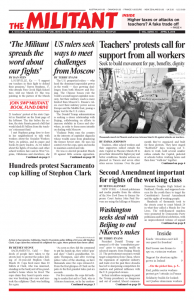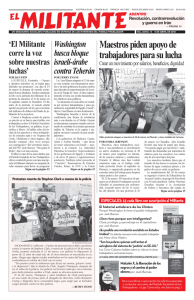DUBLIN, Ireland — “Abortion has to be free, safe and legal. We will discuss calmly, courteously and intelligently. Get the vote out and vote for repeal,” was the message when some 5,000 campaigners for the repeal of the Eighth Amendment to the Irish Constitution rallied here on International Women’s Day March 8. The amendment, adopted 35 years ago, “acknowledges the right to life of the unborn” and effectively prevents women’s access to abortion.
A growing campaign for abortion rights led Irish Prime Minister Leo Varadkar to announce Jan. 29 that a new referendum to repeal the amendment will be held this spring.
Many young people joined the protest, carrying banners like “School students for the repeal of the Eighth Amendment” and “School students for choice.”
Nadia Paez Dieter, a 32-year-old teacher from Argentina, told us she was surprised to learn about the situation for women in Ireland. She has been part of the fight going on in Argentina to win safe and legal abortion. “Women die in dangerous and illegal clinics there,” she said. “It’s our freedom that’s at stake.” That same day hundreds of thousands marched in Buenos Aires, demanding a woman’s right to choose abortion.
Catharina Tirsén, one of the authors of this article, is standing as a candidate for the Communist League in the United Kingdom for Manchester City Council. “Your fight is one example of a political awakening and growing resistance around the world,” read a message of solidarity she got out to fellow marchers. “Women and men in their hundreds of thousands took to the streets in Iran in December against the regime’s wars in Iraq, Syria and Yemen, its assaults on women’s rights and other attacks on working people. Teachers and other school workers struck in West Virginia in the United States. They say: ‘We’re fighting for all workers.’”
She was joined by other members of the Communist League on the march, who carried a sign reading, “Women’s right to choose strengthens unity on road to workers power.”
Changes in social attitude
There have been significant changes in social relations and attitudes in Ireland. The number of working women jumped 20 percent since 1993. Restrictions on the sale of contraception were dropped in 1993, divorce was legalized in 1996, votes in 1992 and 2002 altered the law to permit abortion if a woman was deemed a suicide risk, and same sex marriage was legalized by a 62 percent vote in 2015.
There remains substantial opposition to changing the abortion ban. After the pro-repeal demonstrations, tens of thousands gathered here March 10 in an “All Ireland Rally for Life” called by the Save the Eighth campaign, backed by the Roman Catholic Church.
“I have convinced my parents and my sister to vote for repeal,” a woman named Amy told us as we demonstrated March 8. “But my brother is very much against abortion. He says that is what the referendum is about, not a woman’s right to choose. “I’m worried because it’s not certain repeal will win,” she said. “It is important to reach outside Dublin and into the countryside.”
Communist League members spent two days going door to door in working-class neighborhoods in Dublin to discuss the referendum and broader politics. We explained we’re building a party that can lead the fight to get rid of capitalism and replace it with a government of workers and small farmers. We said we were in Dublin to support the repeal demonstration and to learn about what’s facing working people.
Linda O’Sullivan, a young special needs teacher, spoke with Ólof Andra Proppé and Dag Tirsén on her doorstep in Finglas, about how the abortion question is connected to the broader crisis of capitalism, to the fights by school workers in West Virginia and other working-class struggles. “This is a good time for you to come and raise these ideas here,” she said. “Ireland is changing.”
Lively debate
“I keep thinking about it, I don’t know what to vote,” one woman told Proppé. “Abortion shouldn’t be too easy. But I have accompanied two of my friends to England for abortions.”
One young man said he was concerned because a young woman he knew had had an abortion without telling her boyfriend. “But I am going to vote yes, it has to be the woman’s decision,” he said.
“I don’t agree with repealing the Eighth Amendment and making abortion legal. A lot of people have abortions on very loose grounds,” Annette Brennan, a hairdresser from Finglas, told Pamela Holmes and Dag Tirsén. “People should take more responsibility for their own actions.”
“It’s not a question of being for or against abortion,” responded Holmes. “It’s who makes the decision. Women need the right to control their own bodies, not the government.”
“One hundred years ago women were part of the Russian Revolution and gained the right to vote, to divorce and to legal abortion — three of the most important conquests for women,” Dag Tirsén said. “Without them women can’t be full citizens.”
“You’ve got a point there,” Brennan said. “I may reconsider how I vote. Things are changing and maybe you can’t stop the changes.” She got a subscription to the Militant and we promised to stay in touch.

